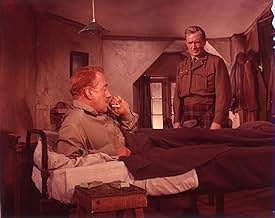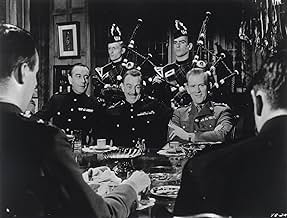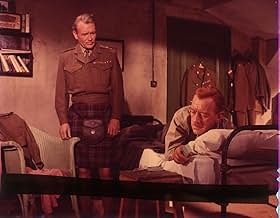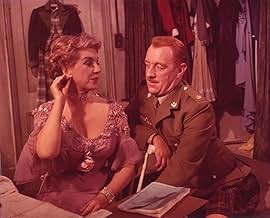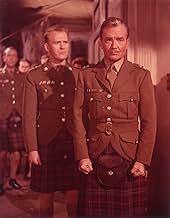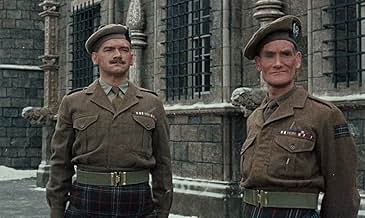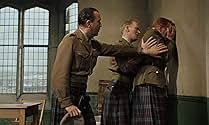Ajouter une intrigue dans votre langueAfter World War II, a Highland Regiment's acting Commanding Officer, who rose from the ranks, is replaced by a peace-time Oxford-educated Commanding Officer, leading to a dramatic conflict b... Tout lireAfter World War II, a Highland Regiment's acting Commanding Officer, who rose from the ranks, is replaced by a peace-time Oxford-educated Commanding Officer, leading to a dramatic conflict between the two.After World War II, a Highland Regiment's acting Commanding Officer, who rose from the ranks, is replaced by a peace-time Oxford-educated Commanding Officer, leading to a dramatic conflict between the two.
- Nommé pour 1 Oscar
- 2 victoires et 7 nominations au total
Avis à la une
Sadly, for him, his informal barracks is going to be reformed under the auspices of the public school via Sandhurst graduate Lt. Col. Basil Barrow (John Mills) who believes in doing all things by-the-book. This sets the scene for a post WW2 power battle under a grey Scottish winter sky.
When writing a review of any excellent film - such as this - you are frightened you are going to put people off by its limits. However this is a classic example of less really being more. The claustrophobic atmosphere and the sense that armies without wars are prone to be heavy with politics. Not unlike like prisons: To many people in the same space with too much time on their hands. They drive men mad and extend the worst in the human character.
Guinness and Mills are fantastic actors. Oscar winners both and more. They could read the phone book and captivate an audience. For the record they had both seen war service, although Mills baby face and short stature had made him the butt of many jokes (many he was happy to re-tell). Did this help form his character? The guy who was laughed at and therefore worked even harder to enforce discipline or gain respect. This is, naturally, speculation.
I have no the knowledge of author (of book and film) but just by watching you know he has seen it for real. The little details that only the insider would know. The story would just as well be served as a theatre piece and it employs some its stock devices. The accidental narrator being the more obvious. Maybe this was to save money, but it would not have helped the picture to see - say - the incident that Mills had to endure from the Japanese.
Eyewitness testimony from the filming says that Guinness thought he would look silly in a kilt and used fake tanner on his pale legs. He is not the biggest of men and has to stick out his chest and stand on tiptoe to be imposing, but you do believe him. What an actor he was. An actor's actor. Like Peter Sellars, totally bland out of character (and not always very nice as he writes in his various autobiographies) but always mesmeric on screen. Mills - on the other hand - could never work as a bad guy. The perfect uncle figure who you would want to confide in.
(I am maybe giving the support cast short-shrift - but most British films of the time had quality character actors. No exception here. Amazing to see Susannah York in her first role.)
Alfred Hitchcock himself said Tunes of Glory was his own personal favourite film. It is not quite mine, but a great demonstration of how brilliant film can be when top class actors get their teeth in to a wonderful script. The end is pure Shakespeare. Don't watch it once, watch it twice...
The more I watch this film, the more I appreciate the wealth of detailed characterization it contains. On Barrow's first meeting with the officers of the regiment, as he is introduced to the rotund Major "Dusty" Miller, note John Mills' quick downward glance of disapproval at the Major's corpulent gut. In the following scene, where Jock Sinclair offers Barrow a whiskey, Barrow courteously replies that whiskey does not agree with him, to Jock's dismay. We later learn that Barrow is emotionally unstable, has problems controlling his rage, and that his family life has broken up. Could alcoholism be an issue, explaining his aversion to whiskey? While Guinness and Mills are justly praised, I find the performance by Dennis Price as Major Charlie Scott to be very interesting as well. Bringing to mind Ralph Richardson, he exudes an oily, genteel but detached sort of upper-crust English manner that Colonel Sinclair gleefully mocks ("old boy, old boy, old boy"). When RSM Riddick (Percy Herbert, distractingly bringing to mind Michael Palin in appearance and exaggerated military manner) tries to officially express the doubts of those in his own strata in the military hierarchy about the prosecution of Jock Sinclair, Barrow's first reaction is curiously bemused and sarcastic ("you astonish me"). Barrow subsequently snaps into martinet mode and brusquely dismisses Riddick's petition. His initial bemusement, though, is telling in that his instinct is not to take this man, from a lower level of the social and military hierarchy, seriously at all, treating him almost as an unruly child who needs be put in his place. Having seen power struggles, personality clashes, and class divisions like this in my work experience, I see that this all rings true. As foreign, exotic, and strange as the setting, characters, and language are to an American like me, the themes of this story are so universal that they can be immediately appreciated by almost anyone who's experienced life to some degree.
As for the language, it's a delight to finally have a DVD with English subtitles to clarify some of the spoken lines. The picture, by the way, is excellent on the new DVD, except for the intermittent appearance of a dark streak down the right side of the screen near the end of the film. I would have thought this could be fixed with digital restoration, but the cost of that might have been prohibitive, and though a little distracting, it really doesn't spoil my enjoyment. I think it's fitting that there are no negative reviews here thus far.
Working from a tight, intelligent screenplay by James Kennaway (adapted from his own novel), Neame delivers a taut, insightful character driven drama that explores the diversity of human nature, and illustrates the good and evil contained within us all and the traits which ultimately determine which will be the prevalent manifestation of the individual personality. Through the device of placing the protagonist and the antagonist-- each the antithesis of the other-- in a no-win situation, the film examines motivations, actions and reactions that can lead the story in any number of directions, none of which are positive, but all of which are logical and which finally leads to a conclusion that is extremely powerful, incisive and totally believable.
As Jock Sinclair, you see Alec Guinness in a role quite unlike anything else he's ever done; it was, in fact, his own personal favorite of all of his cinematic creations. Sinclair is a man who is course and rough-hewn, an egoist who, when the personal need arises, will wantonly subject those around him to psychological cruelty in order to elevate himself and his position and to assuage his own ego. At mess, for example, he derides a young officer for not smoking his cigarette like a man; he orders every `man' to drink whiskey, implying that to do otherwise constitutes an assessment of an individual's masculinity. Boisterous bravura and ribald behavior are his tools of navigation through life, coupled with an attitude of doing things his way or the wrong way. And Guinness plays it to the hilts. Beginning with his whole perspective and attitude, he IS Sinclair, while physically he embodies and expresses exactly who this man is and what he stands for. At times, his eyes fairly bulge with an enthusiasm that suggests a lasciviousness underlying the cruelty; when he walks he strides purposefully, and carries himself in such a way that when he enters a room he veritably fills it and makes his presence felt so that the very air seems oppressed by him. It's a performance that, even in a strong year of Oscar contenders (Trevor Howard, Lancaster, Lemmon, Olivier and Tracy were all up for Best Actor-- Lancaster won) he deserved to be among them. In this film Guinness is quite simply unforgettable in one of his most powerful roles.
John Mills, as well, delivers a superb, introspective performance as Barrow, capturing the way in which this man must live so inwardly to survive, and conveying how difficult it is for him to continue on while attempting to live up to his heritage and the expectations of a position to which he is clearly unfit in his current mental state. In Barrow we see reflected the prevailing attitude of the times that `might makes right,' and that anything less is akin to unacceptable negligence, that same military mind-set that put Jake Holman at odds with the world in `The Sand Pebbles,' and led to the unfortunate incident depicted so eloquently in `A Few Good Men.' It's an excellent, understated, sensitive performance by Mills, who plays brilliantly off of Guinness's brutishness.
The film also boasts a number of excellent supporting performances, especially Dennis Price, as Major Charlie Scott, whose stoic assessment of himself as well as the situation at hand serves as the film's conscience; Gordon Jackson as the sympathetic Captain Jimmy Cairns; and Duncan Macrae in a memorable turn as Pipe Major Duncan MacLean.
Also included in this outstanding supporting cast are Kay Walsh (Mary), John Fraser (Ian), Susannah York (In her film debut as Morag Sinclair), Percy Herbert (Riddick), Allan Cuthbertson (Eric) and Angus Lennie (Orderly). A powerful film that so successfully demonstrates the devastating effects of dysfunctional human relationships and conveys the need to look beyond ourselves, `Tunes of Glory' presents a story to which everyone will be able to relate because the theme is applicable to any setting involving human interactions. A thoroughly involving film featuring a number of memorable performances (especially by Guinness) that will give you reason to take pause and reflect, and hopefully add some perspective to a world too often mired in unnecessary turmoil. I rate this one 10/10.
Le saviez-vous
- AnecdotesSir Alec Guinness was offered the role of Lieutenant Colonel Barrow, but asked for the role of Major Sinclair instead. He then suggested Sir John Mills for the other role.
- GaffesPipe Major MacLean is never shown with a set of bagpipes. In particular, he is a mere observer at band practice. A pipe major is not only the leader of the band but also its chief instructor, and it is unthinkable that he would not play an active role in all practices.
- Citations
Major Jock Sinclair, D.S.O., M.M.: We're on a first name basis in this regiment. Your first name is Derek. My first name is Major.
- ConnexionsFeatured in Film Extra: Alec Guiness (1973)
Meilleurs choix
- How long is Tunes of Glory?Alimenté par Alexa
Détails
- Date de sortie
- Pays d’origine
- Langue
- Aussi connu sous le nom de
- Tunes of Glory
- Lieux de tournage
- Stirling Castle, Stirling, Écosse, Royaume-Uni(establishing shots)
- Sociétés de production
- Voir plus de crédits d'entreprise sur IMDbPro
- Durée1 heure 47 minutes
- Couleur
- Rapport de forme
- 1.66 : 1


